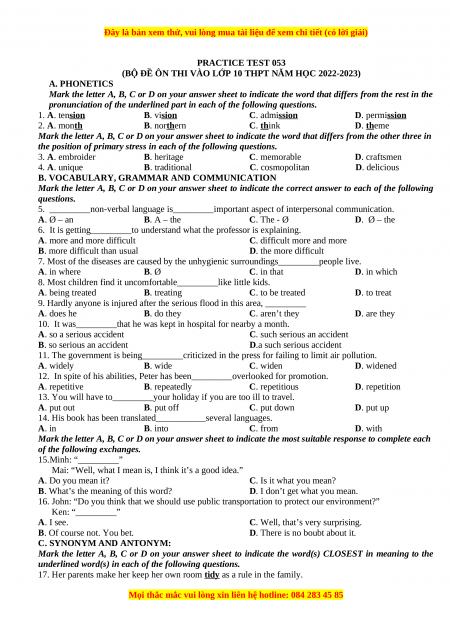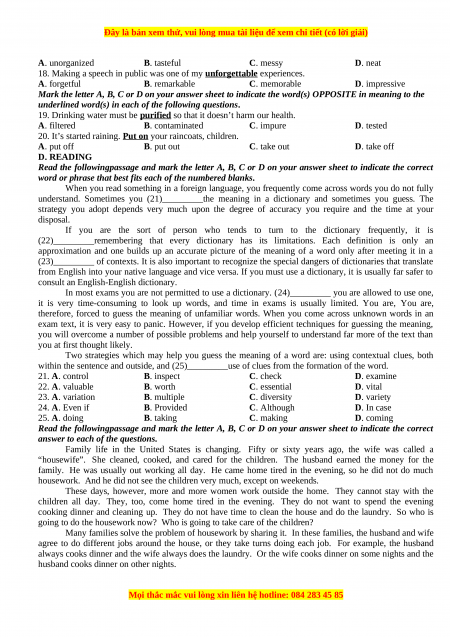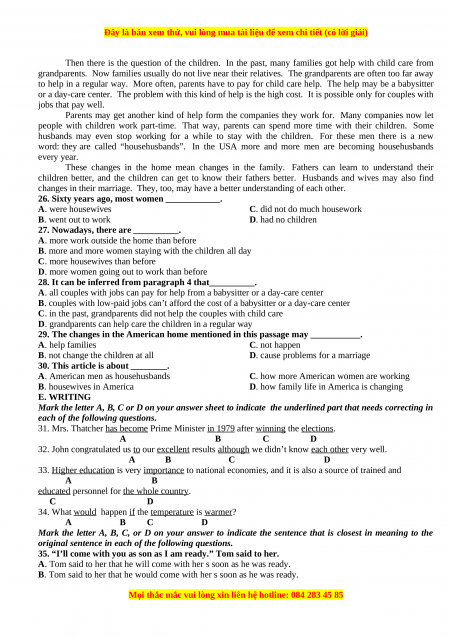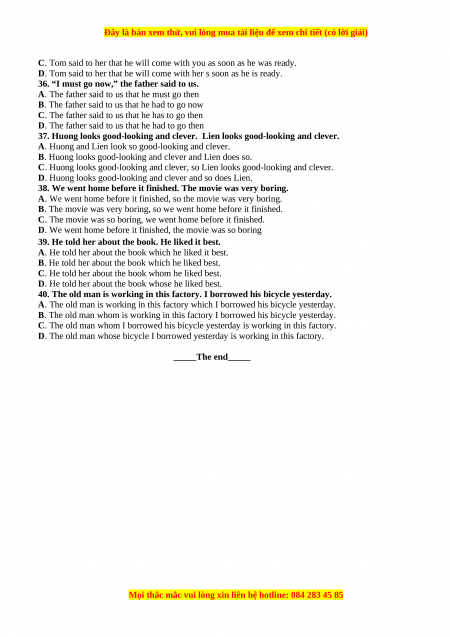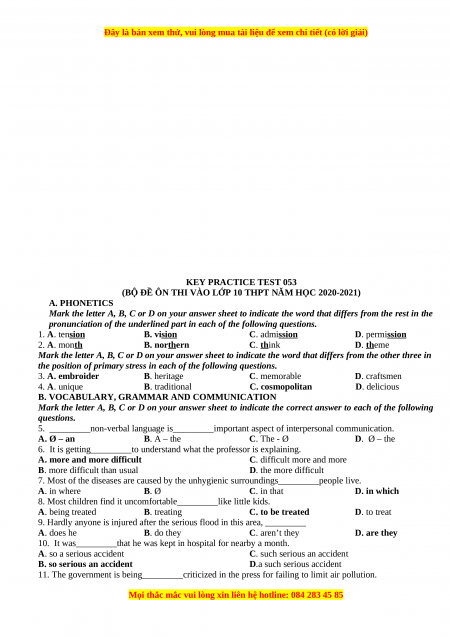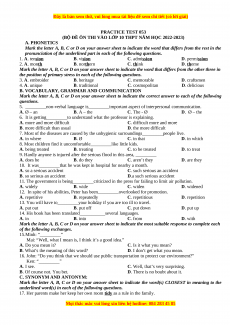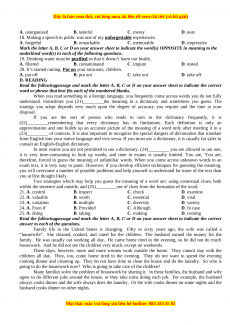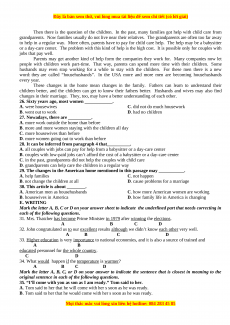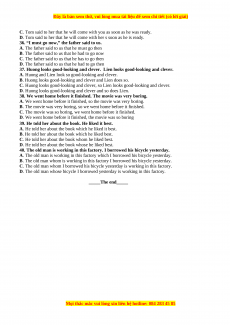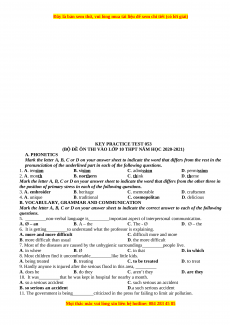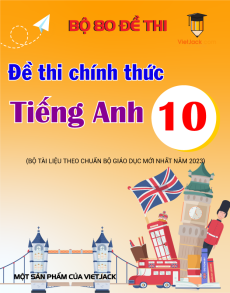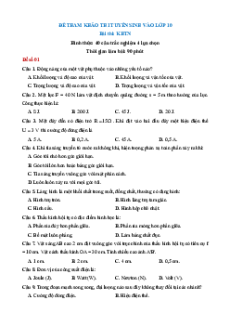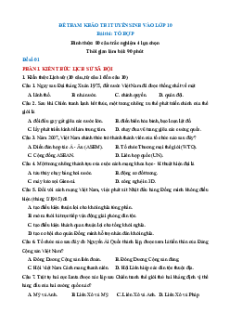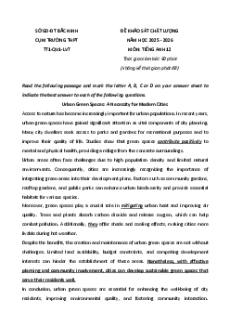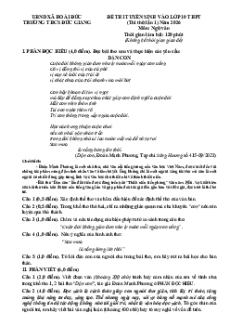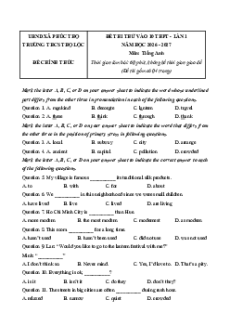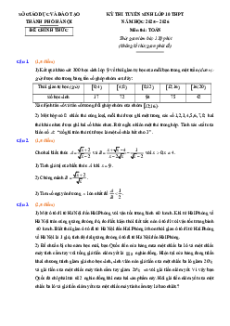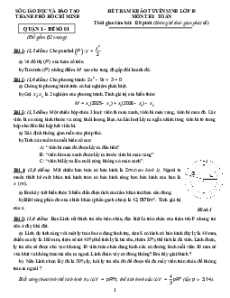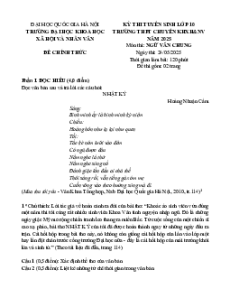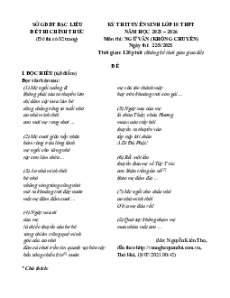PRACTICE TEST 053
(BỘ ĐỀ ÔN THI VÀO LỚP 10 THPT NĂM HỌC 2022-2023) A. PHONETICS
Mark the letter A, B, C or D on your answer sheet to indicate the word that differs from the rest in the
pronunciation of the underlined part in each of the following questions. 1. A. tension B. vision C. admission D. permission 2. A. month B. northern C. think D. theme
Mark the letter A, B, C or D on your answer sheet to indicate the word that differs from the other three in
the position of primary stress in each of the following questions. 3. A. embroider B. heritage C. memorable D. craftsmen 4. A. unique B. traditional C. cosmopolitan D. delicious
B. VOCABULARY, GRAMMAR AND COMMUNICATION
Mark the letter A, B, C or D on your answer sheet to indicate the correct answer to each of the following questions.
5. _________non-verbal language is_________important aspect of interpersonal communication. A. Ø – an B. A – the C. The - Ø D. Ø – the
6. It is getting_________to understand what the professor is explaining.
A. more and more difficult
C. difficult more and more
B. more difficult than usual D. the more difficult
7. Most of the diseases are caused by the unhygienic surroundings_________people live. A. in where B. Ø C. in that D. in which
8. Most children find it uncomfortable_________like little kids. A. being treated B. treating C. to be treated D. to treat
9. Hardly anyone is injured after the serious flood in this area, _________ A. does he B. do they C. aren’t they D. are they
10. It was_________that he was kept in hospital for nearby a month.
A. so a serious accident
C. such serious an accident
B. so serious an accident
D.a such serious accident
11. The government is being_________criticized in the press for failing to limit air pollution. A. widely B. wide C. widen D. widened
12. In spite of his abilities, Peter has been_________overlooked for promotion. A. repetitive B. repeatedly C. repetitious D. repetition
13. You will have to_________your holiday if you are too ill to travel. A. put out B. put off C. put down D. put up
14. His book has been translated___________several languages. A. in B. into C. from D. with
Mark the letter A, B, C or D on your answer sheet to indicate the most suitable response to complete each of the following exchanges.
15.Minh: “_________”
Mai: “Well, what I mean is, I think it’s a good idea.” A. Do you mean it? C. Is it what you mean?
B. What’s the meaning of this word?
D. I don’t get what you mean.
16. John: “Do you think that we should use public transportation to protect our environment?” Ken: “_________” A. I see.
C. Well, that’s very surprising.
B. Of course not. You bet.
D. There is no boubt about it. C. SYNONYM AND ANTONYM:
Mark the letter A, B, C or D on your answer sheet to indicate the word(s) CLOSEST in meaning to the
underlined word(s) in each of the following questions.
17. Her parents make her keep her own room tidy as a rule in the family.
A. unorganized B. tasteful C. messy D. neat
18. Making a speech in public was one of my unforgettable experiences. A. forgetful B. remarkable C. memorable D. impressive
Mark the letter A, B, C or D on your answer sheet to indicate the word(s) OPPOSITE in meaning to the
underlined word(s) in each of the following questions.
19. Drinking water must be purified so that it doesn’t harm our health. A. filtered B. contaminated C. impure D. tested
20. It’s started raining. Put on your raincoats, children. A. put off B. put out C. take out D. take off D. READING
Read the followingpassage and mark the letter A, B, C or D on your answer sheet to indicate the correct
word or phrase that best fits each of the numbered blanks.
When you read something in a foreign language, you frequently come across words you do not fully
understand. Sometimes you (21)_________the meaning in a dictionary and sometimes you guess. The
strategy you adopt depends very much upon the degree of accuracy you require and the time at your disposal.
If you are the sort of person who tends to turn to the dictionary frequently, it is
(22)_________remembering that every dictionary has its limitations. Each definition is only an
approximation and one builds up an accurate picture of the meaning of a word only after meeting it in a
(23)_________ of contexts. It is also important to recognize the special dangers of dictionaries that translate
from English into your native language and vice versa. If you must use a dictionary, it is usually far safer to
consult an English-English dictionary.
In most exams you are not permitted to use a dictionary. (24)_________ you are allowed to use one,
it is very time-consuming to look up words, and time in exams is usually limited. You are, You are,
therefore, forced to guess the meaning of unfamiliar words. When you come across unknown words in an
exam text, it is very easy to panic. However, if you develop efficient techniques for guessing the meaning,
you will overcome a number of possible problems and help yourself to understand far more of the text than you at first thought likely.
Two strategies which may help you guess the meaning of a word are: using contextual clues, both
within the sentence and outside, and (25)_________use of clues from the formation of the word. 21. A. control B. inspect C. check D. examine 22. A. valuable B. worth C. essential D. vital 23. A. variation B. multiple C. diversity D. variety 24. A. Even if B. Provided C. Although D. In case 25. A. doing B. taking C. making D. coming
Read the followingpassage and mark the letter A, B, C or D on your answer sheet to indicate the correct
answer to each of the questions.
Family life in the United States is changing. Fifty or sixty years ago, the wife was called a
“housewife”. She cleaned, cooked, and cared for the children. The husband earned the money for the
family. He was usually out working all day. He came home tired in the evening, so he did not do much
housework. And he did not see the children very much, except on weekends.
These days, however, more and more women work outside the home. They cannot stay with the
children all day. They, too, come home tired in the evening. They do not want to spend the evening
cooking dinner and cleaning up. They do not have time to clean the house and do the laundry. So who is
going to do the housework now? Who is going to take care of the children?
Many families solve the problem of housework by sharing it. In these families, the husband and wife
agree to do different jobs around the house, or they take turns doing each job. For example, the husband
always cooks dinner and the wife always does the laundry. Or the wife cooks dinner on some nights and the
husband cooks dinner on other nights.
Then there is the question of the children. In the past, many families got help with child care from
grandparents. Now families usually do not live near their relatives. The grandparents are often too far away
to help in a regular way. More often, parents have to pay for child care help. The help may be a babysitter
or a day-care center. The problem with this kind of help is the high cost. It is possible only for couples with jobs that pay well.
Parents may get another kind of help form the companies they work for. Many companies now let
people with children work part-time. That way, parents can spend more time with their children. Some
husbands may even stop working for a while to stay with the children. For these men there is a new
word: they are called “househusbands”. In the USA more and more men are becoming househusbands every year.
These changes in the home mean changes in the family. Fathers can learn to understand their
children better, and the children can get to know their fathers better. Husbands and wives may also find
changes in their marriage. They, too, may have a better understanding of each other.
26. Sixty years ago, most women ____________. A. were housewives
C. did not do much housework B. went out to work D. had no children
27. Nowadays, there are __________.
A. more work outside the home than before
B. more and more women staying with the children all day
C. more housewives than before
D. more women going out to work than before
28. It can be inferred from paragraph 4 that__________.
A. all couples with jobs can pay for help from a babysitter or a day-care center
B. couples with low-paid jobs can’t afford the cost of a babysitter or a day-care center
C. in the past, grandparents did not help the couples with child care
D. grandparents can help care the children in a regular way
29. The changes in the American home mentioned in this passage may ___________. A. help families C. not happen
B. not change the children at all
D. cause problems for a marriage
30. This article is about ________.
A. American men as househusbands
C. how more American women are working
B. housewives in America
D. how family life in America is changing E. WRITING
Mark the letter A, B, C or D on your answer sheet to indicate the underlined part that needs correcting in
each of the following questions.
31. Mrs. Thatcher has become Prime Minister in 1979 after winning the elections. A B C D
32. John congratulated us to our excellent results although we didn’t know each other very well. A B C D
33. Higher education is very importance to national economies, and it is also a source of trained and A B
educated personnel for the whole country. C D
34. What would happen if the temperature is warmer? A B C D
Mark the letter A, B, C, or D on your answer to indicate the sentence that is closest in meaning to the
original sentence in each of the following questions.
35. “I’ll come with you as son as I am ready.” Tom said to her.
A. Tom said to her that he will come with her s soon as he was ready.
B. Tom said to her that he would come with her s soon as he was ready.
C. Tom said to her that he will come with you as soon as he was ready.
D. Tom said to her that he will come with her s soon as he is ready.
36. “I must go now,” the father said to us.
A. The father said to us that he must go then
B. The father said to us that he had to go now
C. The father said to us that he has to go then
D. The father said to us that he had to go then
37. Huong looks good-looking and clever. Lien looks good-looking and clever.
A. Huong and Lien look so good-looking and clever.
B. Huong looks good-looking and clever and Lien does so.
C. Huong looks good-looking and clever, so Lien looks good-looking and clever.
D. Huong looks good-looking and clever and so does Lien.
38. We went home before it finished. The movie was very boring.
A. We went home before it finished, so the movie was very boring.
B. The movie was very boring, so we went home before it finished.
C. The movie was so boring, we went home before it finished.
D. We went home before it finished, the movie was so boring
39. He told her about the book. He liked it best.
A. He told her about the book which he liked it best.
B. He told her about the book which he liked best.
C. He told her about the book whom he liked best.
D. He told her about the book whose he liked best.
40. The old man is working in this factory. I borrowed his bicycle yesterday.
A. The old man is working in this factory which I borrowed his bicycle yesterday.
B. The old man whom is working in this factory I borrowed his bicycle yesterday.
C. The old man whom I borrowed his bicycle yesterday is working in this factory.
D. The old man whose bicycle I borrowed yesterday is working in this factory. _____The end_____
Đề luyện thi vào 10 môn Tiếng anh năm 2023 có đáp án (Đề 53)
1.2 K
607 lượt tải
MUA NGAY ĐỂ XEM TOÀN BỘ TÀI LIỆU
CÁCH MUA:
- B1: Gửi phí vào TK:
1133836868- CT TNHH DAU TU VA DV GD VIETJACK - Ngân hàng MB (QR) - B2: Nhắn tin tới Zalo VietJack Official ( nhấn vào đây ) để xác nhận thanh toán và tải tài liệu - giáo án
Liên hệ ngay Hotline hỗ trợ: 084 283 45 85
Đề thi được cập nhật liên tục trong gói này từ nay đến hết tháng 6/2023. Chúng tôi đảm bảo đủ số lượng đề đã cam kết hoặc có thể nhiều hơn, tất cả có BẢN WORD, LỜI GIẢI CHI TIẾT và tải về dễ dàng.
Để tải tài liệu gốc về máy bạn click vào nút Tải Xuống ở trên!
Thuộc bộ (mua theo bộ để tiết kiệm hơn):
- Tailieugiaovien.com.vn giới thiệu bộ 80 đề luyện thi vào 10 môn Tiếng anh mới nhất năm 2022 - 2023 nhằm giúp Giáo viên có thêm tài liệu tham khảo đề luyện thi Tiếng anh ôn luyện vào 10.
- File word có lời giải chi tiết 100%.
- Mua trọn bộ sẽ tiết kiệm hơn tải lẻ 50%.
Đánh giá
4.6 / 5(1213 )5
4
3
2
1
Trọng Bình
Tài liệu hay
Giúp ích cho tôi rất nhiều
Duy Trần
Tài liệu chuẩn
Rất thích tài liệu bên VJ soạn (bám sát chương trình dạy)
TÀI LIỆU BỘ BÁN CHẠY MÔN Tiếng Anh
Xem thêmTÀI LIỆU BỘ BÁN CHẠY Ôn vào 10
Xem thêmTài liệu bộ mới nhất

!"#$%#&$&'$()*
+,-./$0%12345 6($0 $/7809#:(::;:(:*
"< 03/&$%#'
Mark the letter A, B, C or D on your answer sheet to indicate the word that differs from the rest in the
pronunciation of the underlined part in each of the following questions.
1. ". ten=> +. vi=> #. admi==> ?. permi==>
2. ". mon +. norern #. ink ?. eme
Mark the letter A, B, C or D on your answer sheet to indicate the word that differs from the other three in
the position of primary stress in each of the following questions.
3. ". embroider +. heritage #. memorable ?. craftsmen
4. ". unique +. traditional #. cosmopolitan ?. delicious
+<13#"+@4"!AB!"88"!"/?#388@/%#"$%3/
Mark the letter A, B, C or D on your answer sheet to indicate the correct answer to each of the following
questions.
5. _________non-verbal language is_________important aspect of interpersonal communication.
". Ø – an +. A – the #. The - Ø ?. Ø – the
6. It is getting_________to understand what the professor is explaining.
". more and more difficult
+. more difficult than usual
#. difficult more and more
?. the more difficult
7. Most of the diseases are caused by the unhygienic surroundings_________people live.
". in where +. Ø #. in that ?. in which
8. Most children find it uncomfortable_________like little kids.
". being treated +. treating #. to be treated ?. to treat
9. Hardly anyone is injured after the serious flood in this area, _________
". does he +. do they #. aren’t they ?. are they
10. It was_________that he was kept in hospital for nearby a month.
". so a serious accident
+. so serious an accident
#. such serious an accident
?.a such serious accident
11. The government is being_________criticized in the press for failing to limit air pollution.
". widely +. wide #. widen ?. widened
12. In spite of his abilities, Peter has been_________overlooked for promotion.
". repetitive +. repeatedly #. repetitious ?. repetition
13. You will have to_________your holiday if you are too ill to travel.
". put out +. put off #. put down ?. put up
14. His book has been translated___________several languages.
". in +. into #. from ?. with
Mark the letter A, B, C or D on your answer sheet to indicate the most suitable response to complete each
of the following exchanges.
15.Minh: “_________”
Mai: “Well, what I mean is, I think it’s a good idea.”
". Do you mean it?
+. What’s the meaning of this word?
#. Is it what you mean?
?. I don’t get what you mean.
16. John: “Do you think that we should use public transportation to protect our environment?”
Ken: “_________”
". I see.
+. Of course not. You bet.
#. Well, that’s very surprising.
?. There is no boubt about it.
#<'A/3/A8"/?"/$3/A8C
Mark the letter A, B, C or D on your answer sheet to indicate the word(s) CLOSEST in meaning to the
underlined word(s) in each of the following questions.
17. Her parents make her keep her own room D as a rule in the family.=
8EFFG>C(HI:H*I)H)

". unorganized +. tasteful ====== #. messy===== ?. neat
18. Making a speech in public was one of my J>K experiences.=
". forgetful========= +. remarkable========= #. memorable======= ?. impressive
Mark the letter A, B, C or D on your answer sheet to indicate the word(s) OPPOSITE in meaning to the
underlined word(s) in each of the following questions<
19. Drinking water must be LKJD so that it doesn’t harm our health.
". filtered +. contaminated #. impure ?. tested
20. It’s started raining. > your raincoats, children.=
". put off +. put out #. take out ?. take off
?<!&"?%/B
Read the followingpassage and mark the letter A, B, C or D on your answer sheet to indicate the correct
word or phrase that best fits each of the numbered blanks.
When you read something in a foreign language, you frequently come across words you do not fully
understand. Sometimes you (21)_________the meaning in a dictionary and sometimes you guess. The
strategy you adopt depends very much upon the degree of accuracy you require and the time at your
disposal.
If you are the sort of person who tends to turn to the dictionary frequently, it is
(22)_________remembering that every dictionary has its limitations. Each definition is only an
approximation and one builds up an accurate picture of the meaning of a word only after meeting it in a
(23)_________ of contexts. It is also important to recognize the special dangers of dictionaries that translate
from English into your native language and vice versa. If you must use a dictionary, it is usually far safer to
consult an English-English dictionary.
In most exams you are not permitted to use a dictionary. (24)_________ you are allowed to use one,
it is very time-consuming to look up words, and time in exams is usually limited. You are, You are,
therefore, forced to guess the meaning of unfamiliar words. When you come across unknown words in an
exam text, it is very easy to panic. However, if you develop efficient techniques for guessing the meaning,
you will overcome a number of possible problems and help yourself to understand far more of the text than
you at first thought likely.
Two strategies which may help you guess the meaning of a word are: using contextual clues, both
within the sentence and outside, and (25)_________use of clues from the formation of the word.
21.=". control +. inspect #. check ?. examine
22.=". valuable +. worth #. essential ?. vital
23.=". variation +. multiple #. diversity ?. variety =======
24.=". Even if +. Provided #. Although ?. In case
25. ". doing +. taking #. making ?. coming=======
Read the followingpassage and mark the letter A, B, C or D on your answer sheet to indicate the correct
answer to each of the questions.
Family life in the United States is changing.= Fifty or sixty years ago, the wife was called a
“housewife”.= She cleaned, cooked, and cared for the children.= The husband earned the money for the
family.= He was usually out working all day.= He came home tired in the evening, so he did not do much
housework.= And he did not see the children very much, except on weekends.=
These days, however, more and more women work outside the home.= They cannot stay with the
children all day.= They, too, come home tired in the evening.= They do not want to spend the evening
cooking dinner and cleaning up.= They do not have time to clean the house and do the=laundry.= So who is
going to do the housework now?= Who is going to take care of the children?
Many families solve the problem of housework by sharing it.= In these families, the husband and wife
agree to do different jobs around the house, or they take turns doing each job.= For example, the husband
always cooks dinner and the wife always does the laundry.= Or the wife cooks dinner on some nights and the
husband cooks dinner on other nights.
8EFFG>C(HI:H*I)H)

Then there is the question of the children.= In the past, many families got help with child care from
grandparents.= Now families usually do not live near their relatives.= The grandparents are often too far away
to help in a regular way.= More often, parents have to pay for child care help.= The help may be a babysitter
or a day-care center.= The problem with this kind of help is the high cost.= It is possible only for couples with
jobs that pay well.
Parents may get another kind of help form the companies they work for.= Many companies now let
people with children work part-time.= That way, parents can spend more time with their children.= Some
husbands may even stop working for a while to stay with the children.= For these men there is a new
word:=they=are called “househusbands”.= In the USA more and more men are becoming househusbands
every year.
These changes in the home mean changes in the family.= Fathers can learn to understand their
children better, and the children can get to know their fathers better.= Husbands and wives may also find
changes in their marriage.= They, too, may have a better understanding of each other.
:M<N'K=>>=O>PPPPPPPPPPPP<
".=were housewives
+.=went out to work
#.=did not do much housework
?.=had no children
:Q<N/>OD=KKPPPPPPPPPP<
".=more work outside the home than before
+.=more and more women staying with the children all day
#.=more housewives than before
?.=more women going out to work than before
:H<N%JKKDJK>LKKLIPPPPPPPPPP<
".=all couples with jobs can pay for help from a babysitter or a day-care center
+.=couples with low-paid jobs can’t afford the cost of a babysitter or a day-care center
#.=in the past, grandparents did not help the couples with child care
?.=grandparents can help care the children in a regular way
:R<N$="K>>D=L==PPPPPPPPPPP<
".=help families
+.=not change the children at all
#.=not happen
?.=cause problems for a marriage
*(<N$=K=>PPPPPPPP<
".=American men as househusbands
+.=housewives in America
#.=how more American women are working
?.=how family life in America is changing
&<S!%$%/B
Mark the letter A, B, C or D on your answer sheet to indicate the underlined part that needs correcting in
each of the following questions.
31. Mrs. Thatcher has become Prime Minister in 1979 after winning the elections.
" + # ?
32. John congratulated us to our excellent results although we didn’t know each other very well.
" + # ?
33. Higher education is very importance to national economies, and it is also a source of trained and
" +
educated personnel for the whole country.
# ?
34. What would happen if the temperature is warmer?
" + # ?
Mark the letter A, B, C, or D on your answer to indicate the sentence that is closest in meaning to the
original sentence in each of the following questions.
*)<T%U>O>==>=%KD<V$>=D>K<
". Tom said to her that he will come with her s soon as he was ready.
+. Tom said to her that he would come with her s soon as he was ready.
8EFFG>C(HI:H*I)H)

#. Tom said to her that he will come with you as soon as he was ready.
?. Tom said to her that he will come with her s soon as he is ready.
*M<T%=>>OVJK=D>=<
". The father said to us that he must go then
+. The father said to us that he had to go now
#. The father said to us that he has to go then
?. The father said to us that he had to go then
*Q<0>>>W=>>D;>>WDK<4>>W=>>D;>>WDK<
". Huong and Lien look so good-looking and clever.
+. Huong looks good-looking and clever and Lien does so.
#. Huong looks good-looking and clever, so Lien looks good-looking and clever.
?. Huong looks good-looking and clever and so does Lien.
*H<SO>J>KJ=D<$>O=K>K<
". We went home before it finished, so the movie was very boring.
+. The movie was very boring, so we went home before it finished.
#. The movie was so boring, we went home before it finished.
?. We went home before it finished, the movie was so boring
*R<0>DK>>>W<0WD=<
". He told her about the book which he liked it best.
+. He told her about the book which he liked best.
#. He told her about the book whom he liked best.
?. He told her about the book whose he liked best.
I(<$>D=O>KW=J>K<%>KK>OD==KD<
". The old man is working in this factory which I borrowed his bicycle yesterday.
+. The old man whom is working in this factory I borrowed his bicycle yesterday.
#. The old man whom I borrowed his bicycle yesterday is working in this factory.
?. The old man whose bicycle I borrowed yesterday is working in this factory.
PPPPP$DPPPPP
8EFFG>C(HI:H*I)H)

X&A !"#$%#&$&'$()*
+,-./$0%12345 6($0 $/7809#:(:(;:(:6
"< 03/&$%#'
Mark the letter A, B, C or D on your answer sheet to indicate the word that differs from the rest in the
pronunciation of the underlined part in each of the following questions.
1. ". ten=> +<=> #. admi==> ?. permi==>
2. ". mon +<>KK #. ink ?. eme
Mark the letter A, B, C or D on your answer sheet to indicate the word that differs from the other three in
the position of primary stress in each of the following questions.
3. "<K>DK +. heritage #. memorable ?. craftsmen
4. ". unique +. traditional #<>=>L> ?. delicious
+<13#"+@4"!AB!"88"!"/?#388@/%#"$%3/
Mark the letter A, B, C or D on your answer sheet to indicate the correct answer to each of the following
questions.
5. _________non-verbal language is_________important aspect of interpersonal communication.
"<YZ +. A – the #. The - Ø ?. Ø – the
6. It is getting_________to understand what the professor is explaining.
"<>KD>KDJJ
+. more difficult than usual
#. difficult more and more
?. the more difficult
7. Most of the diseases are caused by the unhygienic surroundings_________people live.
". in where +. Ø #. in that ?<O
8. Most children find it uncomfortable_________like little kids.
". being treated +. treating #<>KD ?. to treat
9. Hardly anyone is injured after the serious flood in this area, _________
". does he +. do they #. aren’t they ?<K
10. It was_________that he was kept in hospital for nearby a month.
". so a serious accident
+<=>=K>=D
#. such serious an accident
?.a such serious accident
11. The government is being_________criticized in the press for failing to limit air pollution.
8EFFG>C(HI:H*I)H)
